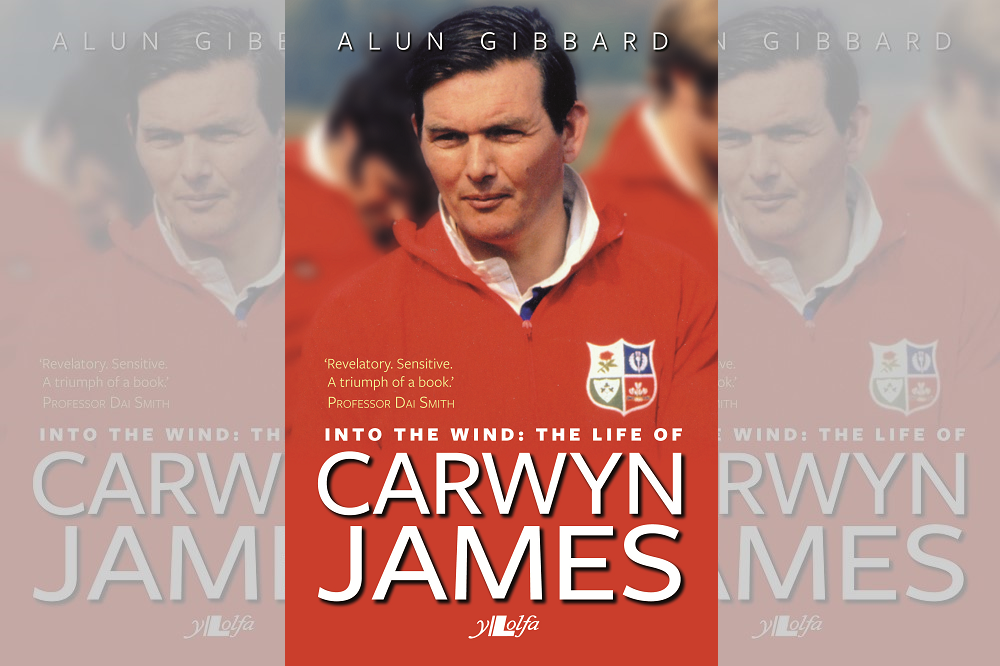Into the Wind: Writing Carwyn James’ biography

Alun Gibbard
Are you going to prove that Carwyn’s gay? That’s a question I regularly faced when people realised I was writing the man’s biography. To them that was the main issue. I grew totally fed up with that question.
I knew that it was something that would need to be dealt with. There had been no shortage of gossip on that topic since the man drew his last breath in an Amsterdam hotel in January 1983. But I also knew that there were so many other rich aspects to Carwyn’s life.
Like most people, my first perception of him was as a rugby man. That’s the Carwyn we all think we know. I went through my teenage years heavily under his influence – the British Lions series victory in New Zealand in 1971, Llanelli beating the All Blacks in 1972 and the Barbarians beating them in 1973 – all coached by Carwyn.
And the icing on the cake, my dad telling me proudly after each success that he was in school with Carwyn. It’s undescribable how I felt when I met Carwyn at the BBC in Cardiff, a week after starting my first job.
Forty years later I randomly realised that he had no biography. There were two volumes that dealt with aspects of hs life, but not a full-blown biography. I found that difficult to believe – as did Y Lolfa publishers. They commissioned me to write one.
That’s where Into the Wind came from. I felt a huge weight of responsibility of having to do justice to a man who wasn’t around to speak for himself. I realised that I had to put my adulation of him to one side and replace it with critical objectivity. I knew that he had family members who were still alive and that I had to be mindful of their feelings without being restricted by them.
Rugby folklore
The research threw up a few suprises. Little was known of his National Service. It was very difficult to find information about what he did as a member of the elite Joint Services School of Linguistics. After months of research, I eventually found five who had served with him in the JSSL.
Learning that Carwyn had been trained so thoroughly to be a spy under the guidance of GCHQ, listening in on Russian messages from Russia to East Germany at one time on a boat off the German coast, was fascinating.
It then became apparent to me that Carwyn had been badly let down by two central Welsh institutions. His relationship with the WRU is stuff of rugby folklore. To this day the cry is that the WRU were so wrong to refuse to let him be the coach of Wales. The truth is they didn’t refuse. Carwyn withdrew his application. The WRU couldn’t consider him for a job he hadn’t tried for while others had tried for it.
He was, however, turned down for a WRU vice president role – because he didn’t get enough votes from the WRU affiliated clubs. It was the people who rejected him. His 2 years in Italy gave him soothing relief from the cruel Welsh rugby goldfish bowl.
The real question isn’t why did the WRU turn him down. It’s why did Carwyn not apply? It was a surprise for me to realise this. The question needed an answer. By 1974 he was a weary man. The success of the early 70s had worn him out.
Sensitive soul
This private man, former house master at rural Llandovery College, chapel deacon, had been put in a spotlight no other rugby coach had ever been put under anywhere in the world. Such adulation, such celebrity status sat uncomfortably on his shoulders. It wore him out physically and mentally. By 1974 he had no drive to coach Wales.
The other institution that did him a disservice was BBC Wales. This world-beating rugby coach, a genius ahead of his time, was given a job reading sports bulletins on a shift system. At least HTV gave him TV series where he could show his understanding of Literature, not just rugby.
As my work continued, interviewing over a 100 people, I grew to know the man. The quiet, gentle spirit. The sharp intellect. The sensitive soul. The rugby visionary. The lover of literature, history and poetry, a love that was stronger than his feelings for rugby. And under all that the fragility. The efforts to live with fame. The raging battle to understand his sexuality. He got to the point of realising that he needed to make changes to his tortured life. But he died before resolving anything.
My book doesn’t try to prove that Carwyn was gay, because Carwyn never lived to find the answer for himself. That’s the real tragedy of this tortured genius’ life.
Into the Wind: The Life of Carwyn James is published by Y Lolfa and can be purchased here or from all good bookshops
Support our Nation today
For the price of a cup of coffee a month you can help us create an independent, not-for-profit, national news service for the people of Wales, by the people of Wales.





